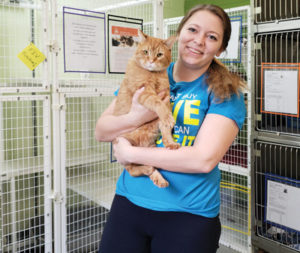By Heather Michon, Correspondent
 When Jessy Shifflett was looking at possible careers, she thought veterinary technician might be a good option. “I always wanted to work for animals.” But because she loves animals, she decided to go to work for the Fluvanna SPCA.
When Jessy Shifflett was looking at possible careers, she thought veterinary technician might be a good option. “I always wanted to work for animals.” But because she loves animals, she decided to go to work for the Fluvanna SPCA.
Vet techs provide an important service, “but you don’t get to know the personality of the animals,” she says. “You’re responsible for just poking them and then saying goodbye.
“Here, you can know each and every animal personally.”
Shifflett started with FSPCA as a cat care worker, then became an animal care assistant, then, for a couple years, served as animal care lead. When manager Meaghan Szwejkowski moved to the west coast earlier this year, Shifflett decided to go for the top spot.
Appointed as manager in late April, she now heads up the staff of about six employees and a shifting crew of volunteers, foster families, and community service workers. Together, her team cares for the daily needs of an average of 100 animals at a time.
Most of their residents are strays, animals that became lost or were abandoned by owners. It’s not uncommon to arrive at work in the morning and find a cat or dog left on the doorstep overnight.
Others come in bearing the scars of abuse and neglect. One newer arrival, a beautiful redbone coonhound named Dan, came in severely undernourished and with a vicious burn running along his spine.
Occasionally, they get something other than a cat or a dog. “We’ve had gerbils, a turtle, a turkey, rabbits….” Shifflett chuckled.
FSPCA is also Fluvanna County’s designated pound, so many new residents arrive via local law enforcement, including those under court-ordered holds following bites or altercations.
Each animal is given an exam on intake to identify serious health issues. Depending on the situation, animals may need anything from just food and water to deworming and vaccinations.
Even grooming can be a necessity. One resident, an orange tabby named Sam, was so matted with excess fur that Shifflett said he weighed almost two pounds lighter after a good cleaning.
Sam suffers from feline immunodeficiency virus, or FIV, a disease that makes him more vulnerable to infections. He’s bonded with fellow FIV sufferer Cheetata. They nap together with Sam draping over Cheetata’s back.
In an ideal world, Cheetata and Sam would find a home together. In reality, it can be hard to find a home for cats with chronic health problems, particularly adults. Kittens and puppies move in and out more quickly than older peers. Pit bulls move out slower than other breeds.
Still, most animals do eventually find their home.
In 2017, 413 animals were adopted and 154 were reunited with owners. Another 128 were transferred to shelters in Charlottesville and Richmond in the hopes they, too, will find their “forever homes.”
One of Shifflett’s big concerns is the medical budget. The shelter spends a minimum of $125 for cats and $170 for dogs, which mostly covers spaying and neutering, vaccines, microchipping, and routine blood work. In 2016, spaying and neutering alone cost $30,000,
But since so many animals arrive with serious health issues and injuries, the cost of veterinary care can easily skyrocket. Surgeries and specialized treatments can add many thousands of dollars to the annual total.
As a no-kill shelter, FSPCA “does not euthanize for space,” she explains. Their mandate is to give animals a safe, clean environment and health care until a permanent home can be found.
The standard measure of a well-run no-kill shelter is the “Live Release Rate,” or LRR. In 2017, FSPCA had a overall 94.5 percent LRR, on par with bigger facilities like Charlottesville.
What would make their days easier? “We would like to have more people,” she says.
The staff works so hard to keep up with the critical tasks that they don’t have the time they’d like to interact with the animals. For creatures that end up spending most of their time in cages, play and stimulation is crucial in keeping them healthy and socialized.
More volunteers and more donors could make a world of difference.
For all the daily worries that come along with the job, Shifflett clearly sees it as a worthwhile effort. Every animal is special, and every one of them can bring something to a person’s life.
“I’ve never gone a day without a dog or a cat,” she says. “A house isn’t a home without an animal.”
The Fluvanna SPCA Is located at 5239 Union Mills Road in Troy. To learn more about how you can help, contact them at 434 – 591 – 0123 or visit their website at www.fspca.org





